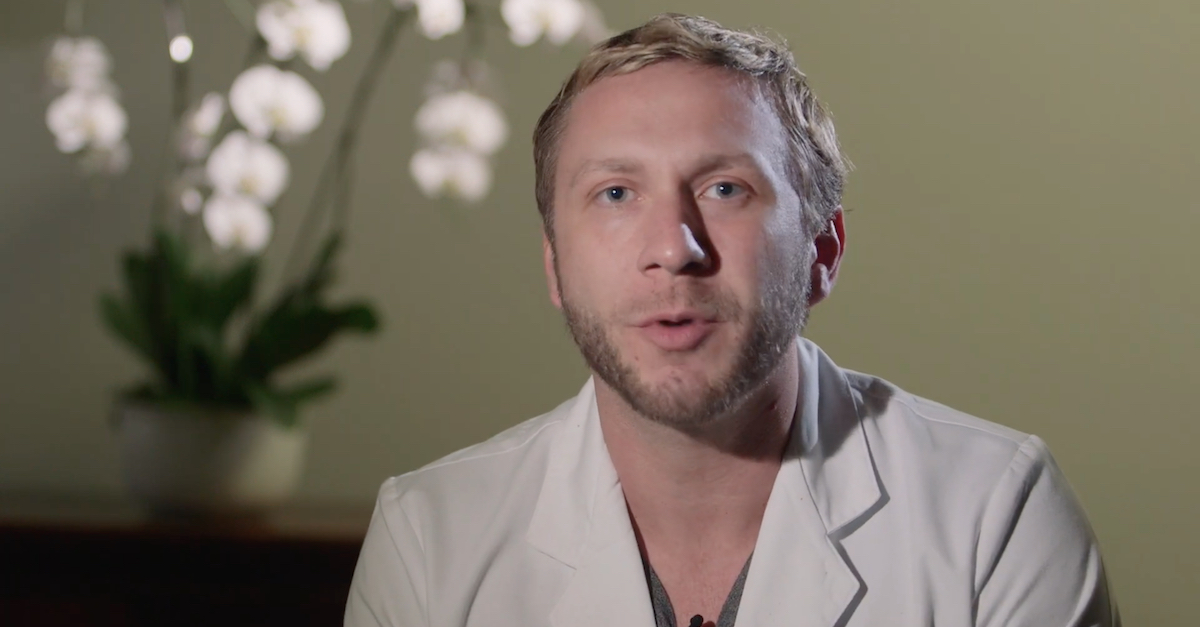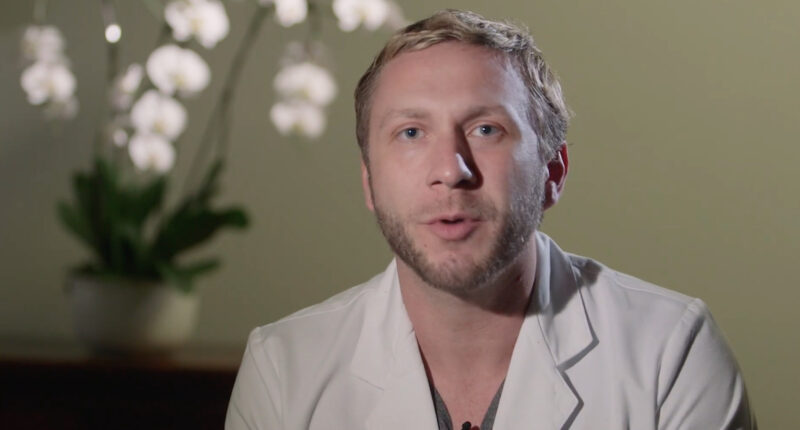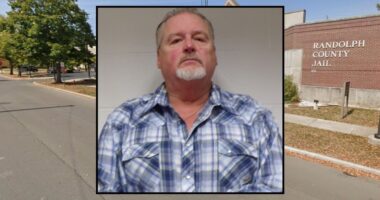
Dr. Serhat Gumrukcu appears in a screengrab taken from an Enochian BioSciences promotional video posted on YouTube.
A Turkish national who resided in a lavish California estate and was employed as a biomedical researcher is now facing a potential life sentence after being found guilty of plotting the murder of a business acquaintance in Vermont back in 2018.
Serhat Gumrukcu was convicted by a federal jury on charges of conspiracy to commit murder for hire, murder for hire, and conspiracy to commit wire fraud, according to court documents. Allegedly, Gumrukcu instructed his co-conspirator, Berk Eratay, to arrange the killing of 49-year-old Gregory Davis, who was on the verge of exposing Gumrukcu’s involvement in a deceitful oil transaction.
As stated in a criminal complaint, the accused individuals recruited a former prison guard named Jerry Banks to impersonate a U.S. Marshal officer, go to Davis’ residence in Danville, and “apprehend” him. Banks, attired in Marshal attire, handcuffed Davis, drove him around 15 miles away, and proceeded to fatally shoot him before leaving his body in a snowdrift alongside a road. At the time, Davis, a father of six with a pregnant wife, fell victim to this gruesome act, as reported by authorities.
Banks pleaded guilty in June 2023 and testified at that Gumrukcu, whom he only knew as the “Turkish Prince,” was behind the plot, Burlington NBC affiliate WPTZ. The government pointed out several times that Gumrukcu often referred to himself by the moniker.
As Law&Crime previously reported, feds also learned Gumruckcu also called himself “His Royal Highness.” Feds laid out the scheme in court documents:
In the early investigation of the case, Serhat Gumrukcu was identified as a likely suspect involved in the murder because Gumrukcu and his brother, Murat Gumrukcu, were the only people who appeared to have a dispute with Davis that would potentially be a motive for Davis’s execution. In 2017, Davis was threatening the Gumrukcus about going to the FBI with evidence that the Gumrukcus were defrauding him in a multimillion-dollar oil deal that the Gumrukcus had entered into with Davis in early 2015. The Gumrukcus failed to perform on the deal and had made various claims about their attempts to perform. Davis believed that the Gumrukcus had lied to him about various matters. During 2017, Serhat Gumrukcu was facing felony fraud charges in California state court. One aspect of those fraud charges involved bounced checks Serhat Gumrukcu had provided to the middleman in the oil deal, Gregory Gac. On the bounced checks, Serhat Gumrukcu falsely called himself “HRH Serhat Gumrukcu,” a reference to “His Royal Highness.”
The accusations continued by referencing the biosciences company which Gumrukcu helped to launch — a company which immediately distanced itself from him when it learned he was arrested:
That same year, 2017, Serhat Gumrukcu was putting together a successful deal that came together soon after the murder, namely, his significant ownership stake in a biotech company, Enochian Bioscience. Gumrukcu therefore had a strong motive to prevent Davis from reporting yet another fraud, and likely threatening the Enochian deal. At present, Serhat Gumrukcu appears to own over $100 million worth of Enochian stock. In May 2022, about a week before his arrest, Serhat Gumrukcu generated $2 million in cash from an Enochian stock sale.
Neither Serhat nor Murat Gumrukcu had traveled to Vermont to personally kill Davis, so the most likely plot involved a hired killer. Murat Gumrukcu, who lives in Turkey, visited the United States between December 2017 and March 2018. He was staying at Eratay’s former apartment in Las Vegas at the time of the murder. Federal agents executed a search warrant at Eratay’s apartment before Murat left the United States. Both Gumrukcus were interviewed in early 2018 about the murder, denying any involvement. Indeed, Murat Gumrukcu falsely denied contact with Gregory Gac, the middleman in the oil deal. Serhat Gumrukcu falsely minimized his involvement in the oil deal. Murat Gumrukcu has not returned to the United States since March 2018.
The document then asserted that Banks “had no relationship with either Serhat Gumrukcu or Gregory Davis.” The alleged connection took time to unravel:
The government discovered a chain connecting them: Banks was friends with Aron Ethridge, who was friends with Eratay, who worked for Gumrukcu. Multiple pieces of evidence supported the link. Banks met with Ethridge on various occasions in late 2017 as the murder scheme was being finalized. Ethridge was the first person Banks telephoned after the murder. Ethridge did not appear to have direct contact with Gumrukcu, but he did have contact with Eratay. Indeed, the first call Ethridge made after receiving the postmurder call from Banks was to Eratay’s phone. Ethridge also had no connection with Davis. Eratay was the obvious link between Ethridge and Gumrukcu.
The money also required investigation. Again, from the document:
The government also developed substantial corroboration of Eratay’s role in the conspiracy. Eratay’s bank records reveal over $150,000 in wire transfers from Turkish accounts controlled by Gumrukcu between June and October of 2017, as the murder scheme was building. Eratay carefully and secretly transformed those funds into cash at the same time. Further, Eratay’s email account showed that he documented personal information about Davis in July 2017, including his full name, date of birth, place of birth, and cell phone with a Vermont area code.
The government asserted that though the investigation appeared to have gone cold from the public’s perspective, it remained ongoing — but “covert” — as agents tracked down the necessary leads.
“The coconspirators, from Banks to Gumrukcu, likely thought that they had gotten away with the murder,” federal prosecutors wrote. But that unraveled when the government “chose to take overt steps.”
The feds said one of the witnesses — Ethridge — immediately flipped:
On April 6, 2022, Banks was arrested in Wyoming. During a custodial interview, Banks made a number of false exculpatory statements. The next day, Ethridge was approached by law enforcement. As noted in the affidavits that will be submitted prior to the detention hearing, although he denied knowledge of any scheme in his initial consensual interview, Ethridge soon reached out to law enforcement to come clean about his role. Ethridge admitted that he hired Banks to kill Davis and that he was in turn hired by Eratay (his former neighbor and friend for years) and Gumrukcu to find someone to murder Davis. Ethridge’s admissions are highly credible, as they are consistent with the other evidence in the case, and because Ethridge has no motivation to falsely implicate himself in a murder. Ethridge has since been indicted and remains detained. The government anticipates that he will be a witness at trial against Eratay, Gumrukcu, and Banks.
At the same time, federal agents interviewed Eratay at his home, as Eratay acknowledges. He spoke willingly to federal agents, but in doing so, made a number of false exculpatory statements, including a denial of knowing anything about Davis.
Eratay pleaded guilty last year.
Davis’ widow filed a wrongful death lawsuit against Gumrukcu.











